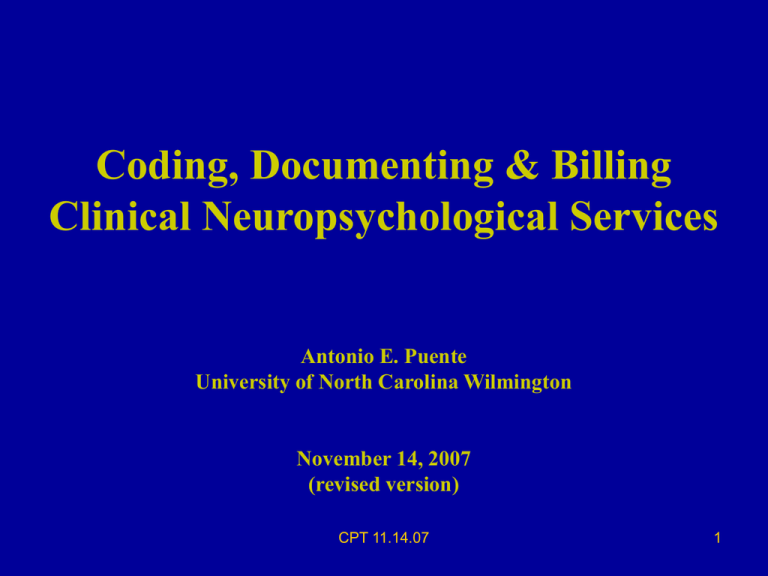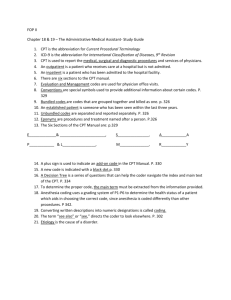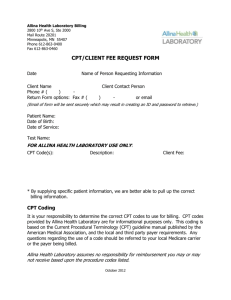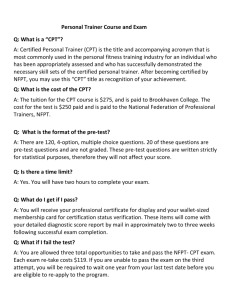Coding, documenting, & billing clinical neuropsychological services
advertisement

Coding, Documenting & Billing Clinical Neuropsychological Services Antonio E. Puente University of North Carolina Wilmington November 14, 2007 (revised version) CPT 11.14.07 1 Dedication: To Those Who Make This Work Possible For Me and For Whom This Work Is Intended For • • • • • • Annelly Bure (Dominican Republic) Tiffany Cummings (North Carolina) Javier Gontier (Chile) Gershom Lazarus (South Africa) Gabriel Salazar (Cuba/Venezuela/USA) Raquel Vila Lopez (Spain) • Krista Puente • Antonio Nicolas Puente (current students- undergrad to postdoc & my two children in psych) CPT 11.14.07 2 Disclaimer The information contained in this extended presentation is not intended to reflect NAN, APA, Division 40, NCPA (or any state psychological association), AMA, CMS (Medicare), state Medicaid and/or any private third party carrier policy. Further, this presentation is intended to be informative and does not supersede APA or state/provincial licensing boards’ ethical guidelines and/or local, state, provincial or national regulations and/or laws. Further, Local Coverage Determination and specific health care contracts supersede the information presented. The information contained herein is meant to provide practitioners as well as health care institutions (e.g., insurance companies) involved in psychological services with the latest information available to the author regarding the issues addressed. This is a living document that can and will be revised as additional information becomes available. The ultimate responsibility of the validity, utility and application of the information contained herein lies with the individual and/or institution using this information and not with any supporting organization and/or the author of this presentation. Suggestions or changes should be directly addressed to the author. Thank you… CPT 11.14.07 3 Acknowledgments North Carolina Psychological Association American Medical Association (AMA) CPT Staff American Psychological Association (APA) Practice Directorate (PD) National Academy of Neuropsychology (NAN) Division of Clinical Neuropsychology of APA (40) National Association of Psychometrists (NAP)/Board of Certified Psychometrists (BCP) Center for Medicare & Medicaid Services (CMS) Medical Policy Staff- Medicare Special thanks to the Department of Psychology @ UNC-Wilmington, James Georgoulakis, Neil Pliskin, Pat Pimental, Tom Erickson and AEP’s Clinical and Research Staff CPT 11.14.07 4 Financial Support Provided by Organizations • APA = All expenses paid for travel (airfare & lodging) associated with CPT activities (no stipend and/or honorarium) • NAN = (from PAIO budget) applied to UNCW activities – 2002-2004 = $10,000 per year – one course for two semesters teaching reduction – 2005 = $5,000 per year – one course for one semester teaching reduction – 2006, 2007 & 2008 = $25,000 per year – used for year round teaching reduction and partial support of university activities (e.g., work assistant graduate student)/no salary obtained from stipend • UNCW = University salary & time away from university duties (e.g., teaching) plus incidental support such as copying, mailing, telephone calls, and secretarial and work-study student assistance CPT 11.14.07 5 Medicare: Local Review • Each Contract Specifies Practice Parameters • Medical Review Policy – National Policy Sets Overall Model – Local Coverage Determination (LCD) Sets Local/Regional Policy• • • • More restrictive than national policy Over-rides national policy Changes frequently without warning or publicity Information best found on respective web pages CPT 11.14.07 6 CPT: Copyright • CPT is Copyrighted by the American Medical Association • CPT Manuals May be Ordered from the AMA at 1.800.621.8335 CPT 11.14.07 7 What Is a CPT Code? • A Coding System Developed by AMA in Conjunction with CMS to Describe Professional Health Services • Each Code has a Specific Five Digit Number and Description as well as a Reimbursable Value • Professional Health Service Provided Across the Country at Multiple Locations • Many “Physicians” or “Qualified Health Professional” Perform Services • Clinical Efficacy is Established and Documented in Peer-Reviewed Scientific/Professional Literature CPT 11.14.07 8 CPT: Applicable Codes • Total Possible Codes = Approximately 7,500 • Possible Codes for Psychology = Approximately 40 to 60 • Sections = Five Primary Separate Sections – – – – – – – Psychiatry (e.g., mental health) Biofeedback Central Nervous System Assessment (testing) Physical Medicine & Rehabilitation Health & Behavior Assessment & Management Team Conference Evaluation and Management CPT 11.14.07 9 Psychiatry: Interviewing • Psychiatry Interviewing – 90801 – One time per illness incident or bout – Un-timed (est. @ approximately 1.5 hours) – Comprehensive analysis of records, observations as well as structured and/or unstructured clinical interview – Includes mental status, history, presenting complaints, impression, disposition CPT 11.14.07 10 Psychiatric: Intervention • Outpatient Therapy – 20 minutes = 90804 – 45-50 minutes = 90806* – 80-90 minutes = 90808 * = most typical service CPT 11.14.07 11 Psychiatry: Interactive Intervention • 90810-90815 • 90823-90829 • Similar Principles as Interactive Interviewing Apply CPT 11.14.07 12 Psychiatry: Intervention Information AMA CPT Workbook, 2007 • “Psychotherapy is the treatment for mental illness and behavioral disturbances in which the clinician establishes a professional contact with the patient related to the resolving of the dynamics of the patient’s problems and, through the definitive therapeutic communication, attempts to alleviate, the emotional disturbance, reverse or change maladaptive patterns of behavior and encourage e personality growth an development.” CPT 11.14.07 13 CPT: CNS Assessment AMA CPT Assistant, 03.06; AMA CPT Assistant, 11.06, 12.06 • Psychological Testing (e.g., 5 units) – Three New Codes – New Numbers & Descriptors • Neurobehavioral Status Exam (e.g., 2 units) – New Number & Revised Descriptor • Neuropsychological Testing (e.g., 10 units) – Three New Codes – New Numbers & Descriptors CPT 11.14.07 14 Psychological Testing: By Professional (01.01.06) • 96101 –Psychological Testing – Psychological testing (includes psychodiagnostic assessment of emotionality, intellectual abilities, personality and psychopathology, e.g., MMPI, Rorschach, WAIS) per hour of psychologist’s or physician’s time, both face-to-face time with the patient and time interpreting test results and preparing the report. CPT 11.14.07 15 Psychological Testing: By Professional (Revised 02.09.07; Implemented 01.01.08) (revisions in italic and underlined) • 96101 –Psychological Testing – Psychological testing (includes psychodiagnostic assessment of emotionality, intellectual abilities, personality and psychopathology, e.g., MMPI, Rorschach, WAIS) per hour of psychologist’s or physician’s time, both face-to-face time administering tests to the patient and time interpreting these test results and preparing the report (96101 is also used in those circumstances when additional time is necessary to integrate other sources of clinical data, including previously completed and reported technician- and computer-administered tests.) (Do not report 96101 for the interpretation and report of 96102, 96103.) CPT 11.14.07 16 96101 Explained (AMA CPT Assistant, November, 2006) • “Code 96101 is reported for the psychological test administration by the physician or psychologist with subsequent interpretation and report by the physician or psychologist. I t also is reported for the integration of information obtained from other sources which is incorporated into the interoperation and reports of test administrated by a technician and/or computer. This provides the meaning of the test results in the context of all the testing and assessments. The potentially confusing aspect of this code is that when the physician or psychologist performs the tests personally, the test specific scoring and interpretation is counted as part of the time of 96101. CPT 11.14.07 17 Psychological Testing: By Technician (01.01.06) • 96102- Psychological Testing – Psychodiagnostic assessment of emotionality, intellectual abilities, personality and psychopathology (e.g., MMPI, Rorschach, WAIS) with qualified health care professional interpretation and report, administered by technician, per hour of technician time, faceto-face CPT 11.14.07 18 96102 Explained (AMA CPT Assistant, November, 2006) • The qualified health professional has previously met with the patient and conducted a diagnostic interview. The test instruments to be used by the technician under the supervision of the professional have been selected. The qualified health care professional introduced the patient to the technician who conducts the remainder of the assessment. The qualified health professional meets again with eh patient in order to answer any last questions about the procedures and to inform him or her about the timetable for the results.” CPT 11.14.07 19 Psychological Testing: By Computer (01.01.06) • 96103 - Psychological Testing – Psychodiagnostic assessment of emotionality, intellectual abilities, personality and psychopathology, (e.g., MMPI) administered by a computer, with qualified health professional interpretation and the report CPT 11.14.07 20 96103 Explained (AMA CPT Assistant, November, 2006) • “The qualified health professional has previously met with the patient and conducted and interview. On the basis of the information gathered from the interview, the professional has selected test instruments that maybe administered by a computer. The qualified health professional installs the computer program/test and instruct the patient on the use of the test. The qualified health processional checks the patient frequently to ensure that he or she is completing the tests correctly. The pofoessional install the next instruemnt and continuous as before until all tests are completed. The qualified health professional meets again with eh patient in order to answer any last question about the procedures and to inform him or her and about timetable for results.” CPT 11.14.07 21 Neurobehavioral Status Exam (01.01.06; Revised 02.09.07; Implemented 01.01.08) • 96116 - Neurobehavioral status exam – Clinical assessment of thinking, reasoning and judgment ( e.g., acquired knowledge, attention, language, memory, planning and problem solving, and visual-spatial abilities) per hour of psychologist’s or physician’s time, both face-to-face time with the patient and time interpreting test results and preparing the report CPT 11.14.07 22 96116 Explained (AMA CPT Assistant, November, 2006) • “A neurobehavioral status exam is completed prior to the administration of neuropsychological testing. The status exam involves clinical assessment of the patient, collateral interviews (as appropriate and review of prior records. The interview would involved clinical assessment of several domains including but limited to; thinking, reasoning and judgment, e.g., acquired knowledge, attention, language, memory, planning and problem solving and visual spatial abilities. The clinical assessment would determine the types of tests and how those tests should be administered.” CPT 11.14.07 23 Neuropsychological TestingBy Professional (01.01.06) • 96118 - Neuropsychological testing – (e.g., Halstead-Reitan Neuropsychological, WMS, Wisconsin Card Sorting) per hour of the psychologist’s or physician’s time, both face-to-face time with the patient and time interpreting test results and preparing the report CPT 11.14.07 24 Neuropsychological Testing: By Professional (Revised 02.09.07; Implemented 01.01.08) (revisions in italic and underlined) • 96118 – Neuropsychological Testing – (e.g., Halstead-Reitan Neuropsychological, WMS, Wisconsin Card Sorting) per hour of psychologist’s or physician’s time, both face-to-face time administering tests to the patient and time interpreting these test results and preparing the report (96118 is also used in those circumstances when additional time is necessary to integrate other sources of clinical data, including previously completed and reported technicianand computer-administered tests.) (Do not report 96118 for the interpretation and report of 96119 or 96120.) CPT 11.14.07 25 96118 Explained (AMA CPT Assistant, November, 2006) • Code 96118 is reported for the neuropsychologicial test administration by the physician or psychologist with subsequent interpretation and report by the physician, or psychologist. It is also reported for the integration of information obtained from other sources which is then incorporated in the more comprehensive interpretation of the meaning the tests results in the context of all testing and assessments. The administration of the tests is completed for the purposes of a physical health diagnosis.” CPT 11.14.07 26 Neuropsychological Testing: By Technician (01.01.06) • 96119 - Neuropsychological testing – (e.g., Halstead-Reitan Neuropsychological, WMS, Wisconsin Card Sorting) with qualified health care professional interpretation and report, administered by a technician per hour of technician time, face-to-face CPT 11.14.07 27 96119 Explained (AMA CPT Assistant, November, 2006) • “The qualified health professional has previously gather information from the patient about the nature of the complaint and the history of the presenting problems. Based on the clinical history, a final selection of tests to be administered is made. The procedures are explained to the patient, and the patient is introduced to the technicians, which administers the tests. During testing, the qualified health professional frequently checks with the technician to monitors the patient’s performance and make any necessary modifications to the test battery or assessment plan. When all tests have been administered, the qualified health professional meets with the patient again to answer any questions.” CPT 11.14.07 28 Neuropsychological TestingBy Computer (01.01.06) • 96120 - Neuropsychological testing – (e.g., WCST) administered by a computer with qualified health care professional interpretation and the report CPT 11.14.07 29 96120 Explained (AMA CPT Assistant, November, 2006) • “Code 96120 is reported for the computer-administrated neuropsychologiscal testing, with subsequent interpretation and report of the specific tests by the physician, psychologist, or other qualified health care professional. This should be reserved for situations where the computerized testing is unassisted by a provider or technician other than the installation of programs/test and checking to be sure that the patient is able to complete the tests. If grater levels of interaction are required, though the test may be computerized administer, then the appropriate physician/psychologist (96118) or technician code (96119) should be used.” CPT 11.14.07 30 Coding Tip (AMA CPT Assistant, November, 2006) • “If the service is provided is less than one hour, append Modifier 52, Reduced Services. After one hour has been completed, time is rounded.” • “It is not unusual that the assessments may include testing by a technician and a computer with interpretation and report by the physician, psychologist or qualified health professional. Therefore, it is appropriate in such cases to report all 3 codes in the family of 96101-96103or 96118-96120.” CPT 11.14.07 31 Coding Tip (AMA CPT Assistant, November, 2006) • “All of the testing and assessment services also require interpretation in the context of other clinical assessments performed by a qualified professional as well as prior records. The use of the term “interpretation” in thee codes is this integrative process. It is not the scoring or interpretation of the result of a specified tests or tests. The scoring process and more limited interpretation is part of the test administration services whether by physician/psychologist, technician and/or computer.” CPT 11.14.07 32 Code Usage (AMA CPT Assistant, November, 2006) • “Typically, the psychological testing services, 96101-96103-, the neurobehavioral status exam, 96116, and the neuropsychological testing services, 96118-96120, are administered once per illness condition or when a significant change in behavior and/or medical/health condition necessitates re-evaluation.” CPT 11.14.07 33 Psychological & Neuropsychological Testing Codes: Simultaneous Use of Professional and Technical/Computer Codes • Medicare Problem Resolved by 01.01.08 • Local Carrier Policy Trumps National Policy • Possibilities Include – No simultaneous use of prof. & technical codes – No problem in using both prof. & technical codes – Alternatives (e.g., modifier 59) • The Use of Modifier 59 – When professional codes and technical/computer codes are used simultaneously – The modifier is used with the non-professional code CPT 11.14.07 34 New Code: fMRI • 96020- Functional Brain Mapping – Neurofunctional test selection and administration during non-invasive imaging functional brain mapping with test administered entirely by a physician or psychologist with review of test results and report – (vs. diagnostic radiology imaging) CPT 11.14.07 35 New Cognitive Testing Code for Use by OT, ST and Others • 96125 – Standardized Cognitive Performance Testing – (e.g., Ross Information Processing Assessment). – (For psychological and neuropsychological testing by a physician or psychologist, see 96101-96103- 96118-96120) CPT 11.14.07 36 New Code for Missed Appointments (CMS Manual System; Pub 100-04 Claims Processing, Transmittal 1279, June 29, 2007) • Allows charging for missed appointments • Missed appointment policy must be applied equally and be explained to patient • Applies to outpatients and, in most cases, hospital outpatient services • Medicare does not make any payments for missed appointment • Fees /Charges are directed to the patient. CPT 11.14.07 37 Telehealth Services (http://www.cms.hhs.gov/manuals/102_policy/bp102index.asp) • Effective 01.01.08 96116 Will Be Available as a TeleMedicine/Telehealth Code • Remote patient face-to-face services seen via live video conferencing • To be used in rural areas or where there are a shortage of providers • Non face-to-face services that can be conducted either through live vide conferencing or via “store and forward” telecommunication services • Home telehealth services • Must be submitted with modifier “GT” (telehealth modifier) CPT 11.14.07 38 Telehealth Services • • • • Individual Psychotherapy Psychiatric Diagnostic Interviewing Neurobehavioral Status Exam Presently discussing Testing Services CPT 11.14.07 39 Health & Behavior: Assessment • 96150 – Health and behavior assessment (e.g., health-focused clinical interview, behavioral observations, psychophysiological monitoring, health-oriented questionnaires) – each unit = 15 minutes – face-to-face with the patient – initial assessment • 96151 – re-assessment – each unit = 15 minutes – Face-to-face with the patient CPT 11.14.07 40 Health & Behavior: Intervention • 96152 – – – – Health and behavior intervention each 15 minutes face-to-face individual • 96153 – group (2 or more patients) • 96154 – family (with the patient present) • 96155 – family (without the patient present; not being reimbursed) CPT 11.14.07 41 Team Conference Codes • 99366 • Medical Team Conference with Interdisciplinary Team by Non-Physician • Allows for Billing Professional Work in Interdisciplinary Team Activities Including Diagnostic and Rehabilitative Services • No Time Allocated but “Team conferences of less than 30 minutes are not reported separately” • Effective 01.01.08 CPT 11.14.07 42 CPT: Model System • General Areas – Psychiatric – Neurological – Health • Specific Approaches – Individual (standard) Vs. Team (emerging) – Face-to-Face Vs. Telehealth CPT 11.14.07 43 CPT: Model Rationale • Rationale for a Specific CPT Code: – Choose Code that Best Describes the Service – Match the Interview with the Testing with the Intervention Code with the Diagnosis – It is Possible, Maybe Desirable, to Mix Codes (e.g., 90801 with 96118 if the purpose & procedure of the activities in question changes due to the information obtained in the process of the evaluation) – Goal = Parsimony, Uniformity and Fluency CPT 11.14.07 44 Diagnosing • Limited Formulary Often Offered by Third Parties • Multiple Diagnoses May be of Value • Psychiatric – DSM • The problem with DSM and neuropsych testing of developmentallyrelated neurological problems • Neurological & Non-Neurological Medical – ICD – 9 CM (physical diagnosis coding) – www.cdc.gov/nchs/about/otheract/icd9 (Note: Always consult LCD information to determine formulary) CPT 11.14.07 45 Medically Reasonable and Necessary Section 1862 (a)(1) 1963 42, C.F.R., 411.15 (k) • “Services which are reasonable and necessary for the diagnosis and treatment of illness or injury or to improve the functioning of a malformed body member” • Re-evaluation should only occur when there is a potential change in; – Diagnosis – Symptoms CPT 11.14.07 46 Documentation: “Assessment” Based on New Interpretation of Codes • Technical Component – Label • Testing by Technician – Information • Individual Tests • Numerical • Basic Qualitative • Professional Component – Label • Examples; Integration of Findings, Testing by Professional – Interpretation • Integration of findings which may include history, prior records, interview(s), and compilation of tests CPT 11.14.07 47 Time: Suggestions for Documentation • Therapy – Minimum: Date(s) Total Time Elapsed – Maximum: Date(s) Start and Stop Times • Testing – Minimum: Date(s) & Total Time Elapsed – Maximum: Date(s) Start and Stop Times • Backup – Scheduling System (e.g., schedule book; agenda, etc) – Testing Sheet with Lists of Tests with Start/Stop Times – Keep Time Information as Long as Records Are Kept CPT 11.14.07 48 “Missed” Time Section 20.3.1. • Billing for Services That Were Not Provided” is Fraud • The Patient Possibly Could be Billed for Missed Appointment (not for missed service), Assuming a Contractual Relationship and Understanding Has Been Previously Established CPT 11.14.07 49 Technicians • What is the Minimum Level of Training Required for a Technician? – National Association of Psychometrists/Board of Certified Psychometrists • www.napnet.org/www.psychometriciancertification.org – 40 & NAN Position Paper • Level of Education- Minimum of Bachelors • Level of Training • Level of Supervision CPT 11.14.07 50 Technician: 1500 Forms • HCFA/CMS Line 25 – This is the line that identifies in a common insurance form who is the “qualified health provider” that is responsible for and completing the service – That individual is the person with whom the contractual relationship is established – Anybody else, from high school graduate to post-doctoral fellow to independently licensed psychologist (but not contractually related professional), is, for all practical purposes, a technician – That technician is not a new class of provider and cannot bill independently of a doctoral level provider CPT 11.14.07 51 Technicians: Next Steps • Development of a National, Widely Accepted System for Identifying and Credentialing Technicians in Conjunction With: – NAN – Division 40 – National Association of Psychometrists & Board of Certified Psychometrists • http://psychometristcertification.org CPT 11.14.07 52 Students as Technicians • Medicare Interpretation – Medicare has never reimbursed for student training for any health disciplines – The assumption is that GME pays training programs and double dipping would occur if the Medicare and the CPT reimbursed for student activity – Two caveats: • This limitation probably applies to Medicare only • Students can perform as technicians as long as they are not being trained and their activity is not part of their educational requirements (e.g., a neuropsychologist in the community employees the student as a technician in their practice) CPT 11.14.07 53 Supervision Program Memorandum Carriers Department of Health and Human Services- HCFA Transmittal b-01-28; April 19, 2001 • Levels of Supervision – General • Furnished under overall direction and control, presence is not required – Direct • Must be present in the office suite and immediately available to furnish assistance and direction throughout the performance of the procedure – Personal • Must be in attendance in the room during the performance of the procedure CPT 11.14.07 54 Solutions: Summary • Medicare – Resolved as of 01.01.08 – Proceed as November, 2007 CPT Assistant and as codes were intended to be used • All Others – See list of suggestions outlined in extended CPT presentation CPT 11.14.07 55 The Future: Pay for Performance (P4P) Initiatives • Premise – Evidence-based guidelines – Outcome more than procedure based • Initial Application – Dartmouth, Duke & Michigan – AMA and APA Practice forming work groups • Estimated Application in Payment Systems – First Set 01.01.08 – Work Group = Merla Arnold, Jean Carter, Katherine Nordal, Paula Hartman-Stein (Gerontologist) CPT 11.14.07 56 Pay for Performance Status • Diagnoses – – – – Medication Verification Pain Assessment Screening for Depression Treatment Planning • Mild Cognitive Disorder – Specific Diagnoses – Specific Process (Documentation?) – Eventually Measure Development • Outcome – Increased Accountability – Increased Remuneration • Check www.usqualitymeasures.org CPT 11.14.07 57 The Future: Medicare Changes • CMS Payment Changes – 08.02.07 – CMS will increase payments of $690 million or 3.3% of the Medicare Budget for Medicare Skilled Nursing Facilities – Decreased reimbursement for procedures and increased reimbursement for E & M activities – http://www.cms.hhs.gov/SNFPPS/downloads/cms1545-f-display.pdf – Fee Schedule Reductions • Anticipated 10.1% unless Congress passes a bill limiting the reduction (passed in the House, pending in the Senate) CPT 11.14.07 58 The Future: Medicare Changes • Congressional Activity – Medicare Fee Schedule must be released by early November and revised with the closing of Congress (most likely an Omnibus bill in mid-December; will result in problems with billing for first quarter of 2008) – Requested = 10.1% reduction – Expected (probably for two years duration) = • Psychotherapy – 5% increase requested, approved by House, pending Senate (as requested by APA) • Testing – none requested, but most likely a .5% increase overall CPT 11.14.07 59 The Future: General Medical Education • $2.6 billion or 5.5% in 2002 (Office of Actuary, 2001) • Includes Funding for Education of Residents But Does Not Include Psychology • THIS NEEDS TO BE ADDRESSED OR TRAINING PROGRAMS WILL HAVE TO FIND ALTERNATIVE FUNDING SOURCES CPT 11.14.07 60 APA & GME (continued) • Postdoctoral Fellows – Not automatically ruled out and therefore could fall into existing GME categories – Four postdoctoral programs are receiving GME funds for the training of psychologists CPT 11.14.07 61 New Initiatives: Insurance • Private Payors – Restricted interpretation by BC/BS of testing codes – Working on resolving this in specific states (e.g., AL, FL, TN, …) • CMS Interpretation of Students/Trainees – Presently cannot use students/trainees IN TRAINING and request reimbursement from Medicare patients using a CPT code – This is due to the interpretation by CMS that psychology receives General Medical Education funds (postdoc training programs may be able to pursue GME funds) – Next step includes either the use of GME funds or allowing student/trainees to bill using CPT codes – This only applies to Medicare CPT 11.14.07 62 New Initiatives: Registration of Psychometrists • Collaborative Project of National Association of Psychometrists, NAN and Division 40 – Initial proposal developed and revised – Presented to NAN and 40 Boards in 2007 – Working towards a 2008 implementation – Working on New York state issues (NY Neuropsychology group) CPT 11.14.07 63 New Initiatives: New York Technicians • Problem • Current Status – As of Friday, 11.08.07 the New York Psychological Association Council voted in favor of pursuing a legislative solution that allows technicians (caveat; IQ = Masters) • Potential Alternatives – National Labor Relations Law Complaint? CPT 11.14.07 64 Final Summary • Negative News – Probable Minimal Increase in Reimbursement (across all health care professions) – Greater Transparency & Accountability (is this really negative?) • Positive News – Much Wider Scope of Practice Reflective of Present and Emerging Practice Patterns – Newer Paradigms (telehealth & team) – Much Better Reimbursement – Much More Uniformity CPT 11.14.07 65 A Summary of Approximately 20 Years: Is the End Really Near? • Expanded from a Approximately 3-4 Codes to Over Several Dozen Codes • Expanded from Psychiatric Only to All of Medicine and Health Care • Expanded from No Uniformity and Lack of Understanding to High Levels of Professionalism and Recognition & Collaboration With Psychology and Medicine/Health Care • Reimbursement Increases Has Outpaced Both Psychology and Other Health Care Disciplines by a Significant Factor CPT 11.14.07 66 The End is Indeed Near… That is, the End of an Era and of Second-Class Citizenship… The Future of Health Care Parity Has Finally Begun to Arrive… It Is Time to Deliver the Promise. CPT 11.14.07 67



